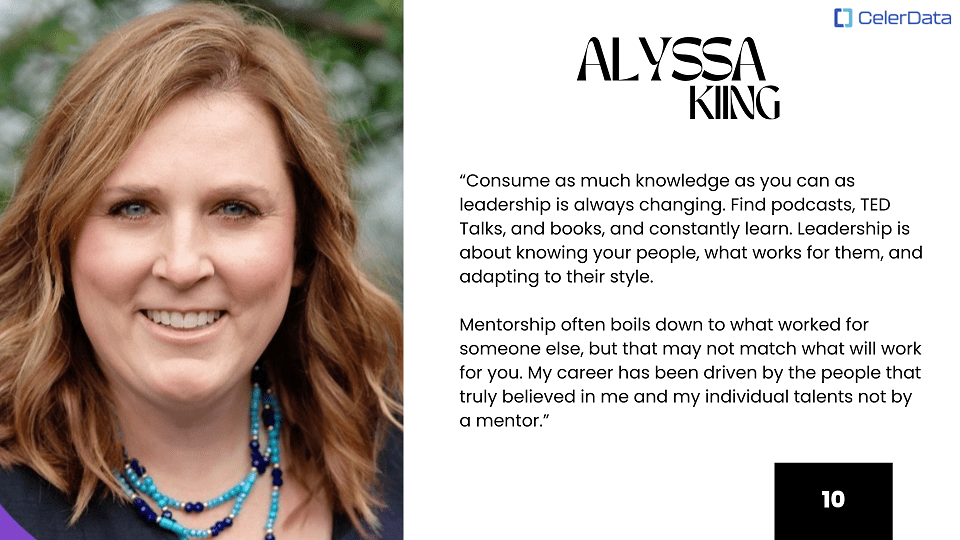Sudipto Ghosh (SG): How do you push for systemic change around ideas that are new or not that popular?
Alyssa King: “I have always believed that your work will speak for itself, but you must take the risk by getting an audience. Know your topic and your audience so you can tell a story and show how the change will impact them. Talk about short-term risks for long-term gains.
Use numbers, but make them visual, because, at the end of the day, it always comes down to numbers.
Be prepared to be questioned, know the answers ahead of time, and if you don’t know say that.
Take feedback and come back to the audience if needed.
To be successful, you must be willing to change, adapt, grow, and listen.”
Top Insights: CIO Influence’s IWD Interview with IBM’s Lisa Hagemann
SG: What career advice do you have for women in tech/STEM?
Alyssa: “Look at your future and bring them to the table with you to show them that they are just as powerful. My 9-year-old daughter is in a STEM-focused gifted and talented program in which she is slowly being exposed to women in the field, but they are few and far between.
Right now, she will sit and code with her daddy. She needs to see women in a career currently dominated by men and she needs you to bring her into their environment. Help her to understand that you can have a successful career while having a life outside of work, and that being adventurous + curious pays off. She will be your future employee. Show her that she can and will be the next ‘Tech 100’ Leader.”
SG: How can women strive for greater gender pay equality?
Alyssa: “Make talking about salary a positive thing and less taboo.
Push organizations to post salaries with job requisitions.
Ask questions and be willing to discuss the difference.
Experience doesn’t just come from a career and helping hiring managers to understand the benefits of working part-time, taking a career break, having a gap in employment, changing industries and careers will change the conversation about pay equality.
So many women had to step out of the workforce during the pandemic to care for their families.
These women helped their kids thrive during virtual school while having babies, preschoolers, and a working significant other in the background. They helped their partners to be successful in their careers by taking a step back. They managed the loneliness of not only themselves but their families and friends. They were creative in ways that many never expected. All of these skills can be translated to a career but only if we are willing to ask the right questions and stop excluding people for enduring unexpected change.”
Recommended: Why Should Companies Invest in a Strong ZTNA Technology
SG: How can women develop their leadership skills?
Alyssa: “Consume as much knowledge as you can as leadership is always changing.
Find podcasts, TED Talks, and books, and constantly learn. Leadership is about knowing your people, what works for them, and adapting to their style. Every person you encounter has a story that influences the way they perform. Knowing those stories will help you develop the people around you.
Early in my management career, I had an employee who was often late for her scheduled work time. I sat her down and asked her what was going on. She shared with me that she was the sole overnight care for her young grandson and often her daughter was late getting off her overnight shift. We adjusted her schedule by 10 minutes, and she was never late again. Years later she came to me and told me that I saved her job because I took the time to ask questions. Know your people and always be learning!”
SG: How important is it to have a mentor to grow as a leader?
Alyssa: “Honestly, I find it is better to have an advocate, someone in your corner that will help you get to the right audiences. Someone that you trust to give you feedback and help you succeed.
Mentorship often boils down to what worked for someone else, but that may not match what will work for you. My career has been driven by the people who truly believed in me and my talents, not by a mentor.”
SG: What strategies can work well to promote inclusion in the workplace?
Alyssa: “This goes back to a previous answer but knowing the people around you. Making it personal in the sense that you handwrite a birthday card or know who coaches their kid’s soccer team or who has an elderly parent they care for a home. I hear ‘leave home at home, or don’t bring home to work.’ That is impossible. People are spending at least ⅓ of their day with you and outside things are going to cross over. Everyone wants to feel valued and knowing a little bit about them is inclusion.”


